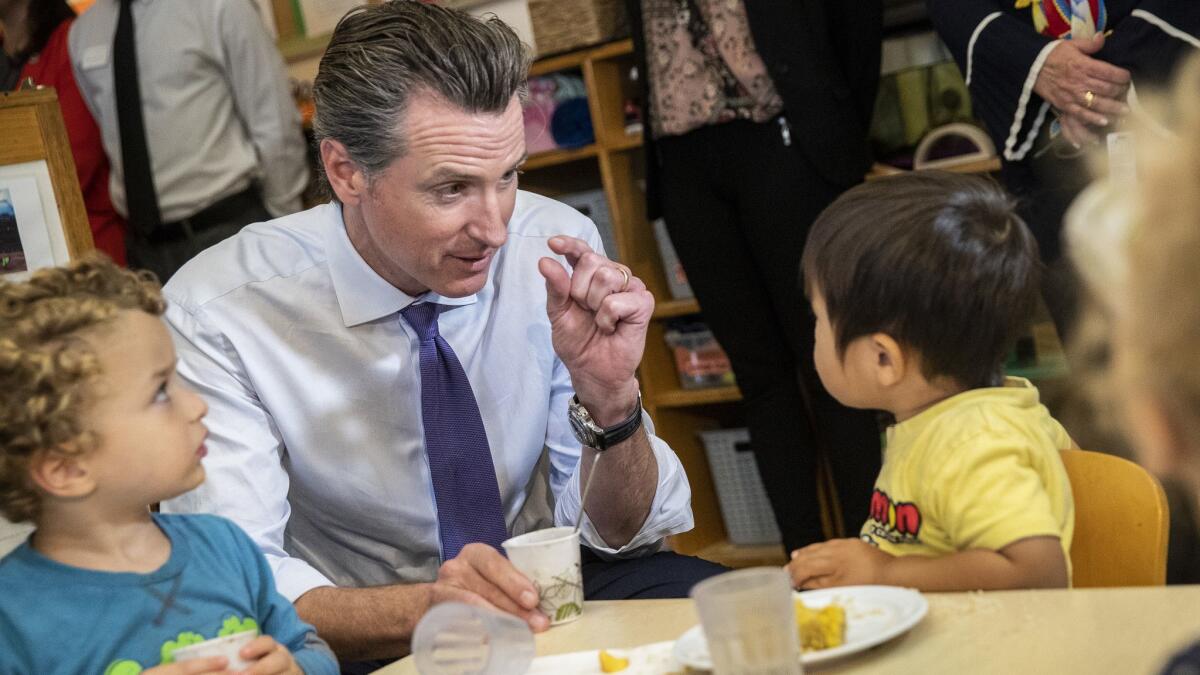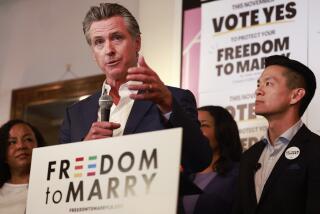Gavin Newsom pushes big-budget early childhood education agenda in closing days of campaign

Reporting from Sacramento — After months of sparring with President Trump and offering honey-tongued campaign promises to combat poverty, unaffordable housing costs and the state’s other deep-rooted ills, Democrat Gavin Newsom is ending his campaign for governor with a heightened focus on the youngest Californians.
The two-term lieutenant governor has vowed to expand and improve early childhood education programs along with prenatal and child care — proposed investments with broad support among California voters and little political risk. Newsom is using the message as the closing argument of his front-running campaign for governor, a strong sign that it would be among his top priorities if he is victorious Tuesday.
Republican challenger John Cox, the son of a Chicago public school teacher, has criticized Newsom for proposing policies that he says rely too heavily on government funding. Instead, Cox says, the next governor should work to make California more affordable, which would allow families to pay for preschool and child care of their choosing.
Newsom has made other pledges to enact a first-of-its-kind single-payer healthcare system covering all Californians and to stem the state’s growing homelessness crisis, two policy agenda items that would also be heavy lifts in Sacramento.
Coverage of California politics »
While Newsom has praised Gov. Jerry Brown’s fiscal discipline and success in pulling the state from the depths of the recession, he has sought to distinguish himself from the governor in the closing days of the election, promising that he would offer a much bolder social and economic agenda if elected.
“We’re going to do things differently. We’re going to be more aggressive on the housing issue, more aggressive on the homeless issue, more aggressive on early childhood education,” Newsom said. “Jerry Brown was the right person at the right time. We’re in a different time in our state’s history, a different time in our nation’s history. I think we’re very well equipped to take the baton.”
But don’t expect to see a spending spree, Newsom said. The Democrat noted this week that, while mayor of San Francisco, he reined in spending by the Board of Supervisors, describing himself as the “proverbial adult in the room” when it came to fiscal restraint. Still, as mayor Newsom implemented universal preschool and universal healthcare during the recession, when the city cut hundreds of millions of dollars from other programs.
“What [Newsom would] do is yet to be seen,” said state Sen. Holly J. Mitchell (D-Los Angeles), chair of the powerful Senate Budget and Fiscal Review Committee. “He’ll have to go through the transition from campaign speak to governing in really short order, and he’ll have a lot of pressing issues.”
Before being elected to the Senate, Mitchell headed one of California’s largest child development organizations, Crystal Stairs, and she praised Newsom for putting children and families at the top of his agenda. In the past she has criticized Gov. Jerry Brown for not doing enough to alleviate poverty and to address the needs of California’s most vulnerable, even after the state’s economy and revenues rebounded following the biggest economic downturn since the Great Depression.
Nine-month-old children on waiting lists for state-subsidized day care “won’t get a do-over,” she said.
“People are suffering today,” Mitchell said. “I think we know the answers. It’s just if we have the political will to, as Nike says, just do it.”
The first indicator of a new governor’s commitment could come as early as January, when a state budget must be submitted to the Legislature, Mitchell said.
Cox, a wealthy real estate investor from Rancho Santa Fe, has said on the campaign trail that teachers should be “paid like rock stars” and has been a strong proponent of giving parents the choice of sending their children to charter schools. But he has been mostly silent about early childhood education programs, which focus on students before they enter kindergarten.
The Republican said that rather than government spending directly on child-care programs, the next governor should enact policies that will put more money in families’ pockets, including reducing housing costs and repealing last year’s gas tax increase.
“The Newsom prescription is to keep the cost of housing really, really high and then he’ll have government come along and give ... people little handouts for a better day care,” Cox said. “That’s not my prescription. My prescription is to build truly affordable housing so that people can afford their life and then they can have the resources to be able to pay for their own day care and choose their own day care.”
Newsom insists he has the will to press forward with his plans to expand early childhood education in California, and he says he is undaunted by the many other compelling needs facing the state. He has not yet specified how much his plans would cost or how he’d pay for them.
“It’s a question of what you value,” Newsom told reporters Wednesday after he handed out Halloween candy to children at Sacramento’s Penleigh Child Development Center.
Stanford education professor Deborah Stipek said research has shown that early brain development in young children, especially during the first three years of life, is pivotal not only to their success in school but also to their overall well-being and prospects in life. That includes lifting children and their families from a life of poverty, substantially decreasing their chances of ending up in prison and improving their physical and mental health.
Stipek was among the lead researchers on a study that found California children enter kindergarten far less prepared for school than their national peers, a learning deficit that they never make up. If California wants to improve student achievement in schools, it needs to invest much more in infant and toddler care, preschool, early childhood education and parenting skills, the report said.
“When I first moved to California, it was basically the model state for early childhood education,” Stipek said. “While California has declined in its investment [in] children from 0 to 5, other states have substantially increased their investment and passed us.”
The research brief recommended streamlining state oversight of the convoluted network of federal, state and local programs that fund and administer early childhood education, including programs such as Head Start, state-sponsored preschool, transitional kindergarten, nurse home visits for pregnant mothers and special education. The state also needs higher standards and pay for preschool teachers and child-care providers, according to the report.
Newsom proposes establishing universal preschool, programs for pre-kindergarten children available to all families, and expanding family leave for parents to care for a newborn.
“The most important investment we can make to address the issue of systemic poverty, address the issue of criminal justice reform, is to begin at the beginning. Invest in prenatal care, early Head Start, nurse home visits, preschool,” Newsom said in his closing statement of a Bay Area gubernatorial forum in early October.
Democratic Assembly Speaker Anthony Rendon created a special bipartisan commission to assess California’s early education needs, calling the issue one of the priorities of his political life.
He said the California Legislature set aside more than $500 million two years ago for early childhood education programs in the state. But that failed to make up for the $1.2 billion in cuts to those programs in the decade before that.
Making up that gap and improving the quality of those programs cannot be done on the cheap, Rendon said.
“It’s fairly expensive if you’re going to do it right,” said Rendon, who before being elected to the Assembly headed an organization to help prepare children for kindergarten. “The payoff is usually a decade or two down the road when kids are graduating high school and college, when they are suffering much lower obesity rates than they were before.”
Conway Collis, co-chairman of a state task force on lifting families and children out of poverty, said providing affordable, quality child care is essential. Collis said he has met with Newsom several times over the years and has always been impressed with the Democrat’s command of the issue and dedication to combating poverty in California.
“The reality is that California has the most children and the highest percentage of children in poverty as any other state in the country,” Collis said. “So whenever we feel good about ourselves as a progressive state, remember that we allowed that to continue.”
Times staff writer Dakota Smith contributed to this report.
Twitter: @philwillon
More to Read
Get the L.A. Times Politics newsletter
Deeply reported insights into legislation, politics and policy from Sacramento, Washington and beyond. In your inbox three times per week.
You may occasionally receive promotional content from the Los Angeles Times.











